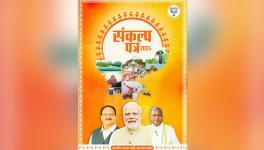Meet the Ones Building the Edifice of Farmers’ Movement
Dressed in a chequered shirt, white turban and holding a shoe brush in hand at Delhi’s Singhu border, Ajeet Pal Singh from Ropar in Punjab, politely offers every farmer passing by to clean and polish their stained shoes. Sometimes, he also mends the shoes of farmers if they are torn.
Stationed at the border protest site along with 17 family members who are serving in individual capacities at langars and other facilities, Singh said that he had a different job till a month back running his own event management company. Recalling his journey from Shri Anantpur Sahib, he told NewsClick, “We left our homes on December 20 and reached here on December 31. We walked about 550 kilometres on foot, campaigned in major cities and villages around the highway about the farm laws and its implications for farmers in particular and common people in general.”
On being asked about the response he got in his journey from Anantpur to Delhi, he said, “It was gratifying. All barriers were broken and I felt we acted as Indians. Some people brought rotis and vegetables. Some offered their place to stay at night. In Panipat, we met a group of Muslim men who were distributing water to farmers. They offered us dry fruits for rest of the journey. It never felt that we were enduring a tiring journey.”
Responding to a question about why he chose this service of mending the shoes of farmers, Singh replied, “When we came here, we saw people were offering their services. I observed the farmers were struggling with torn shoes and very few cobblers were available. So, I went to the nearest market, brought necessary things and started offering my services. Why I chose this job? I think it brings humility. You remain grounded and do not keep unnecessary qualms about yourself. That’s my answer.”
Commenting on the farm laws and the government’s response to the farmers’ movement, he said with a laugh, “Before I answer your answer, let me cite you a saying. A man goes to a tailor with some cloth and asks him to make a pant. Instead, the tailor makes something else and starts pushing customers to buy the product talking about its benefits. The same argument applies to the farm laws. No farmer demanded these laws. Yet, the government is hell bent on narrating its benefits. Jokes apart, does India belong to only two persons? They have been building silos and warehouses much before the laws were introduced. I think the design is clear now.”
“It is correct that I would be losing money. But what would you say to your children and grandchildren if they ask you about your participation in the movement ? My grandparents participated in Independence struggle. How can we not carry forward their legacy?,” he questioned in a response to question about losing his livelihood due to his participation in the movement.
A kilometre away from the main stage at Singhu, Dalveer Singh from Barnala district, is seated along with his sewing machine stitching the clothes of farmers. Talking to NewsClick, Singh said that he first visited protest sites, Singhu and Tikri borders, on December 19. “I found that many farmers were wearing torn shirts and pants. When I asked them, they said that it was a result of scuffles with Haryana Police. Subsequently, I did a small survey among the farmers in trolleys whether they had found a tailor to stitch their clothes. They said that it was difficult to locate them. I returned home on December 20 and told my family that we should offer our services. They readily accepted it. So, I closed my shop and came here to serve.”
When asked how he would compensate the lost income, Singh said, “I was able to engage in tailoring because farmers are earning. Who will come to me if they lose their land? When we were colonised, it was a country who was ruling us. Here, two persons have the same intentions. Mere pass zameen toh nahi hai, par zameer toh hai ( I do not posses land but Conscience.)”
Sitting next to the sewing machine is Jaswinder Kaur, who came from Fatehgarh Sahib District. Busy stitching a coat, Kaur told NewsClick, “I would be doing the same work at home too. What will I do at home when our children are fighting in Delhi ? So, I came here to participate.”
A conversation with her reveals the deep angst among farmers against rural distress comprising unemployment, delayed payment of crops and policies of the Centre. Owning 15 acres of land, Kaur said she is awaiting the payment of sugarcane from the mills for the last two years. “I do not know when the money will come. There are no rates for other crops too, and there is no other way of earning. Our educated youth are wandering in search for jobs. They join agriculture out of compulsion. My daughter who is a trained nurse is milking buffaloes at home. Is Modi not aware about it? First, he snatched our savings through demonetisation. Now, he has brought these laws.”
Talking about the Supreme Court’s comment on the participation of elderly and women in the protest, she said, “We will not abandon our children here. If Modi is so convinced about his laws, why does not he talk to farmers’ representatives straight away? If he thinks we will return because of his unrelenting ego, he is wrong.”
Also read: Farmers Protest: ‘Youths Used to Shy Away from Carrying Union Flags; now They Snatch it From Us’
At the protest site, NewsClick met with Lovepreet Singh from Moga district who has set up the Saanjhi Satth or Shared Chaupal. The space serves as a library, a temporary school and resting space for protesting farmers – men and women.
Lovepreet left his job in an immigration facilitation agency to contribute to the movement. “When I came here, I hardly found any place to rest. I thought we needed such space. So, I proposed setting up the space. When I called people for contributions, a person said he would arrange the tent. Other people brought mats, ropes and other things. When people started coming here for rest, they would often ask for books. So, we arranged some books too. An author who visited us on Monday donated 67 books including two novels written by her. A girl who had been teaching children in nearby slums, approached us to use the space. Now, she teaches here,” he said.
Even though there may not be any visible results of the farmers’ movement yet, Singh believed that it has surely rid the image of Punjab’s youth being drug addicts and bootleggers. He added, “Now, people see us as role models. I think a bold youth leadership can come out of it. Youth which is well read, thinks about reforming society. I think it would be similar to the pre independence times which produced people like Bhagat Singh and Kartar Singh Sarabha.”
While he is not sure when he can return to his old job, Singh said that he wishes to organise people and work against the casteism prevailing in society.
He further explained his experience with caste saying, “I always found that the village was divided into two blocks. The well built area with proper plantation, better sanitation, roads and facilities belonged to the Jatt Community. The other with dilapidated infrastructure, odorous surroundings belonged to lower castes. Yet, people wanted the status quo. When my panchayat got Rs 28 lakh sanctioned, people wanted to rebuild the crematorium. I said the work could be averted. It was important to build roads on other side.”
“At that time, people from the other side said that they are demanding a crematorium because they are uneducated. I was aghast. It was the same people who had for years withheld the access to education, and now they are blaming. We often quote Bhagat Singh. He did not want a casteist, communal India. So, it’s a longer struggle. It’s not limited to farm laws alone,” he added, expressing his hope for a different future.
Get the latest reports & analysis with people's perspective on Protests, movements & deep analytical videos, discussions of the current affairs in your Telegram app. Subscribe to NewsClick's Telegram channel & get Real-Time updates on stories, as they get published on our website.
























